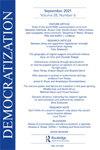Social media, disinformation, and democracy: how different types of social media usage affect democracy cross-nationally
IF 2.9
1区 社会学
Q1 POLITICAL SCIENCE
引用次数: 3
Abstract
ABSTRACT Much speculation exists regarding how social media impacts the health of democracies. However, minimal scholarly research empirically examines the effect social media has on democracy across multiple states and regions. Thus, this article analyses the effect social media and disinformation transmitted over social media have on democracy. The findings from a cross-national, time-series analysis of 158 states from 2000–2019 indicate that different types of social media usage have varying effects on democracy. General social media consumption, the presence of diverse political viewpoints on social media, and the use of social media in political campaigns bolster democracy. However, social media disinformation, online political polarization, and the use of social media to organize offline violence reduce overall levels of democracy. In addition, a mediation analysis is conducted to identify the precise linkages between social media disinformation and democracy and indicates that government and political party disinformation impact democracy by weakening key democratic norms.社交媒体、虚假信息和民主:不同类型的社交媒体使用如何影响全国民主
摘要关于社交媒体如何影响民主国家的健康,人们有很多猜测。然而,最低限度的学术研究实证考察了社交媒体对多个州和地区民主的影响。因此,本文分析了社交媒体和通过社交媒体传播的虚假信息对民主的影响。2000-2009年对158个州进行的跨国家时间序列分析结果表明,不同类型的社交媒体使用对民主有不同的影响。一般的社交媒体消费、社交媒体上各种政治观点的存在,以及在政治竞选中使用社交媒体,都有助于民主。然而,社交媒体的虚假信息、网络政治两极分化以及利用社交媒体组织线下暴力,降低了民主的总体水平。此外,还进行了调解分析,以确定社交媒体虚假信息与民主之间的确切联系,并表明政府和政党虚假信息通过削弱关键的民主规范来影响民主。
本文章由计算机程序翻译,如有差异,请以英文原文为准。
求助全文
约1分钟内获得全文
求助全文
来源期刊

Democratization
POLITICAL SCIENCE-
CiteScore
6.40
自引率
12.50%
发文量
73
期刊介绍:
Democratization aims to promote a better understanding of democratization - defined as the way democratic norms, institutions and practices evolve and are disseminated both within and across national and cultural boundaries. While the focus is on democratization viewed as a process, the journal also builds on the enduring interest in democracy itself and its analysis. The emphasis is contemporary and the approach comparative, with the publication of scholarly contributions about those areas where democratization is currently attracting considerable attention world-wide.
 求助内容:
求助内容: 应助结果提醒方式:
应助结果提醒方式:


